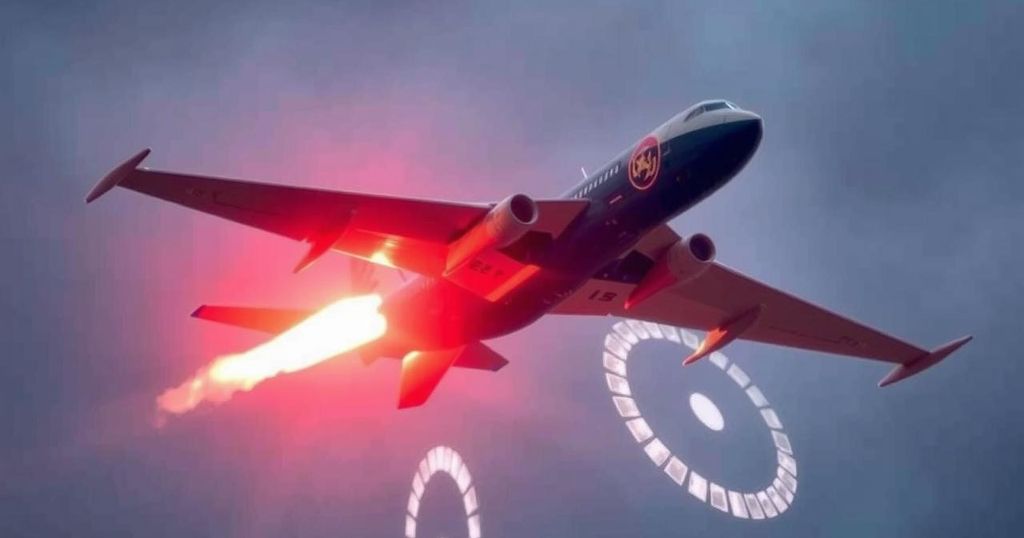Suspected Russian Missile Downed Azerbaijani Passenger Plane, Investigation Ongoing

Azerbaijani officials, backed by initial U.S. assessments, suspect that a Russian surface-to-air missile downed an Azerbaijani passenger jet, resulting in 38 fatalities. The aircraft, which went off course, likely encountered missile fire from Russian air defense systems amidst regional military tensions. A day of mourning has been declared in Azerbaijan as investigations continue into the incident.
Recent reports indicate that a Russian surface-to-air missile may have been the cause of the tragic crash of an Azerbaijani passenger aircraft near the Kazakh city of Aktau. Thirty-eight out of the sixty-seven individuals on board have lost their lives following the flight’s deviation from its intended route. Investigation efforts are ongoing, with statements from Azerbaijani officials suggesting a missile fired from a Russian Pantsir-S air defense system might have struck the aircraft mid-flight, a claim that has garnered attention from various media outlets, including The New York Times and Euronews. The Kremlin, however, has urged caution against jumping to conclusions regarding the incident until a thorough investigation is completed.
Eyewitness accounts indicate that “shrapnel hit the passengers and cabin crew as it exploded next to the aircraft mid-flight,” highlighting the severity of the damage inflicted upon the aircraft. Furthermore, an anonymous U.S. official has noted that preliminary evidence points towards a Russian anti-aircraft system being involved in the crash. As investigators recover flight recorders from the site, speculation continues regarding the involvement of Russian defense systems, given the recent heightened tensions and military activities in the region, purportedly related to Ukrainian drone operations.
Azerbaijan Airlines initially attributed the crash to a collision with a flock of birds; however, they later retracted this assertion. The tragic incident has garnered international attention, prompting expressions of condolences from notable figures, including Azerbaijani President Ilham Aliyev, who announced a day of mourning. As the investigation unfolds, the focus remains on uncovering the sequence of events that led to this catastrophic incident, with the potential ramifications on international relations still to be fully understood.
Survivors have recounted harrowing experiences, with one individual describing the chaotic scene characterized by blood and cries for help. The loss of life and the plight of the survivors underscore the human cost of this disaster, serving as a somber reminder of the tragic consequences of armed conflict and geopolitical tensions.
As the families of the victims mourn their losses, the need for clarity and accountability in the wake of such a grave event becomes ever more pressing. This incident could carry implications for broader regional stability as officials continue to probe the factors behind the crash and the responsibilities of nations involved.
With the memory of Malaysia Airlines flight MH17 hovering in the background, where a similarly tragic fate befell innocents due to missile attacks, calls for transparency and justice are amplified following this latest aviation disaster. The global community watches closely as developments unfold in this tragic scenario, maintaining hope for answers and justice for those affected.
The recent crash of an Azerbaijani passenger jet adds another dimension to the ongoing tensions surrounding military engagements in the region. With historical parallels to previous incidents involving civilian aircraft and military operations, this tragic event underscores the vulnerability of aviation amidst geopolitical conflicts. The specifics regarding flight paths, military activities, and air defense systems highlight the intricate challenges involved in ensuring the safety of civilian passengers. Investigators are now focused on gathering evidence to ascertain the precise cause of the incident and its implications for international relations, particularly among Azerbaijan, Russia, and neighboring nations.
In conclusion, the tragic crash of an Azerbaijani passenger jet, potentially caused by a Russian missile, highlights the ongoing risks associated with military conflicts in the region. The loss of thirty-eight lives has prompted national mourning and raised urgent questions regarding the safety of civilian aviation in areas prone to military activity. As investigations continue, the need for clarity and accountability is paramount. The global community remains attentive to the unfolding story, hoping for a resolution that honors the memory of the victims and addresses the underlying geopolitical tensions that contribute to such tragedies.
Original Source: www.wfxg.com






